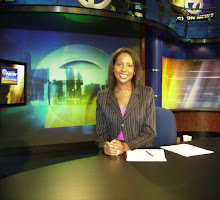One man did talk to me off the record and commented that he wouldn't talk to me because he didn't like all the bad press that the American auto industry was receiving. "I have customers that come in happy to buy a new car, and then come in the next day depressed about it because of all the bad things they hear in the media," he commented. While this was only one person's opinion I had never even considered that was the reason why no one would talk to me about the plant shut-downs. As a young reporter, I think it's so easy to focus on the smallest picture of your single story. Sure you think about being balanced and making sure everything is technically done, but I often forget the impact I will actually have on people with my stories. I forget that so much of this world is culturally shaped by what people see on the television. As a reader, I too get angry at the continuous negative coverage I see of the auto industry in the Detroit Free Press, but as a journalist, I was just focused on getting my story. I'm not writing this to say I wouldn't do the story because I would have if it had become available, but I also think it's important to think about the impact stories have on the community. I have to balance my roles as journalist and citizen to get the best stories around!
My focus this week is to watch some great storytellers and see what they do that I can apply to my own writing. We read Wayne Freedman's book almost every week, but I forget that he's an actual working journalist, not just some guy that writes textbooks. This week I decided to seek some of his stories out to see what he does to make them so captivating and to the point. One of my favorites was about Stanley the cat. Coming from a city like Detroit where if it bleeds it leads, I was reluctant to watch a story about a cat stuck on a telephone point because it basically sounds boring. However I remembered that it was a Freedman story so I knew he would make it great. To start, I was surprised by his use of a live shot. In my mind, live shots are for taking viewers to news as it unfolds. But here we were with a live shot of a cat stuck up a telephone pole. His use of natural sound was also amazing. I don't think he spoke for more than two lines without some sort of natural sound of the cat or neighbors comments. Finally it was the way he built the story around Stanley. Think about it, he could have summed it up in a couple of sentences: "Stanley the cat belongs to Judy, and she says he gets stuck up a pole at least once a week. He's stuck there again today." Instead, he gives you a look into his personality, some history, and of course, remarks by people who can actually speak to make the viewer feel like Stanley is their own neighbor's cat. I really like this humanized aspect of his stories and I think they make for more excitement and enjoyability.
I also liked his story about the Fuller brush salesman. This story seemed to use every wonderful journalism tool that we have been taught: natural sounds, an inquisitive stand up, a golden nugget (surprise) in the middle of the story, and a clear and focused story line. Norman is a door to door salesman with a career that is obviously about a decade outdated. Although this is his day job, he also enjoys acting on the side. This story flows so naturally, I would forget that I was watching the news and not a program about ordinary people living their lives. I think this type of journalism is amazing because you get great stories out there but you're still using your journalism fundamentals. I didn't see the newsworthiness aspect in this story as much, but I definitely saw the goal of telling ordinary people's stories come to life in this example. I know that even Freedman didn't wake up telling the types of stories he tells today, but he is certainly an inspiration to all storytellers out there, regardless of medium.
